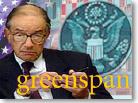|
Greenspan wary of plan
|
 |
January 20, 1999: 12:43 p.m. ET
Favors debt reduction, tax cut over use of surplus for Social Security
|
WASHINGTON (CNNfn) - Federal Reserve Chairman Alan Greenspan opposes the idea of investing money from ongoing budget surpluses into equity markets for the benefit of Social Security, saying he would prefer to see the surplus used to reduce debt or cut taxes as a way to bolster the system.
"I find it difficult to find rational arguments for that particular initiative," says Greenspan Wednesday in response to questions from members of the House Ways and Means Committee about the proposal offered Tuesday night in President Clinton's State of the Union message.
Greenspan says a tax cut would allow individuals to make the investments needed to bolster Social Security, which he says will need to move away from the long-standing pay-as-you-go system as the U.S. population ages. He suggests a 10 percent across-the-board tax cut as a good way of helping boost the system.
But the Fed chief, who says he's "been around Washington too long" to think otherwise, understands that there's a strong political temptation not to let any budget surpluses sit around.
Another aspect of Clinton's speech, recommending an increase in the minimum wage, is also opposed by Greenspan, who believes a boost would make labor markets even tighter and would restrain worker training and advancement.
Economy to moderate, not slowdown
Greenspan also says that although the U.S. economy may moderate in 1999, "signs of an appreciable slowdown as yet remain scant."
The Fed chairman, in his prepared testimony for the committee, says weakness in manufacturing and a potential reduction in demand caused by the Brazilian economic crisis do loom as potential limits to U.S. economic growth.
But he says economic growth remains solid and financial markets have overcome the "freezing up" caused by the summer's economic crisis in Russia to channel "an ample flow of capital to businesses and households."
Greenspan says moderation in economic growth may be necessary to sustain the current expansion. He says that even though higher productivity has managed to keep labor cost increases in check, that can't be expected to continue indefinitely.
And he warns that a sagging of corporate profits indicates that the strength of the stock market may be difficult to sustain. "The level of equity prices would appear to envision substantially greater growth of profits than has been experienced of late," the Fed chairman says.
Greenspan denies that the three rate cuts enacted during the fall were designed to prop up equity prices. He says the cuts responded to "an abrupt stringency in financial markets and the effects that the consequent increased risk aversion was likely to have on economic activity going forward." Nevertheless, he says that the central bank must take movement in equity prices into account as a factor in determining monetary policy.
Favors deregulation, continuing education
Greenspan also says policies to contain inflation and promote competition through deregulation and an open global trading system are the backbone of the economic recovery. "Our task going forward -- at the Federal Reserve as well as in the Congress and (Clinton) administration -- is to sustain and strengthen these policies, which in turn have sustained and strengthened our now record peacetime economic expansion," he says.
Greenspan also recommends that continuing-education programs, particularly for workers lacking skills, may be the best way to get more of the economic growth to spread to lower-income families.
And he says that while's "very chagrined" by the problems besetting the U.S. steel industry, he's wary of recommending punitive action against Japan, Russia and other nations accused of dumping steel into American markets. He says such action would invite reprisals and lead to increased protectionism throughout the world.
Fed ready for Y2K
Greenspan says the Fed is spending a considerable amount to time to make sure both its system and those of the banking system is ready for the so-called Y2K problem. "We're pretty much convinced we're going to be OK," says the Fed chairman. "But there are clearly going to be mistakes which we will not be able to anticipate," particularly in regard to American banking interfaces with the rest of the world.
The Fed chairman warns that government policymakers need to be wary of actions that undermine confidence in financial markets. "For productivity and standards of living to grow, not only must capital raised in markets be allocated efficiently, but internal cash flow, including the depreciation charges from the existing capital stock, must be continuously directed to their most profitable uses," he says. "It is this continuous churning, this so-called creative destruction, that has become so essential to the effective deployment of advanced technologies by this country over recent decades."
Treasury prices, which initially rebounded on first word of Greenspan's comments, have retreated. The U.S. 30-year-bond is down 1 to 100-19/32, yielding 5.20 percent; before his testimony, the bond was down 22/32.
|
|
|
|
|
|
Federal Reserve Board
|
Note: Pages will open in a new browser window
External sites are not endorsed by CNNmoney
|
|
|
|
 |

|

